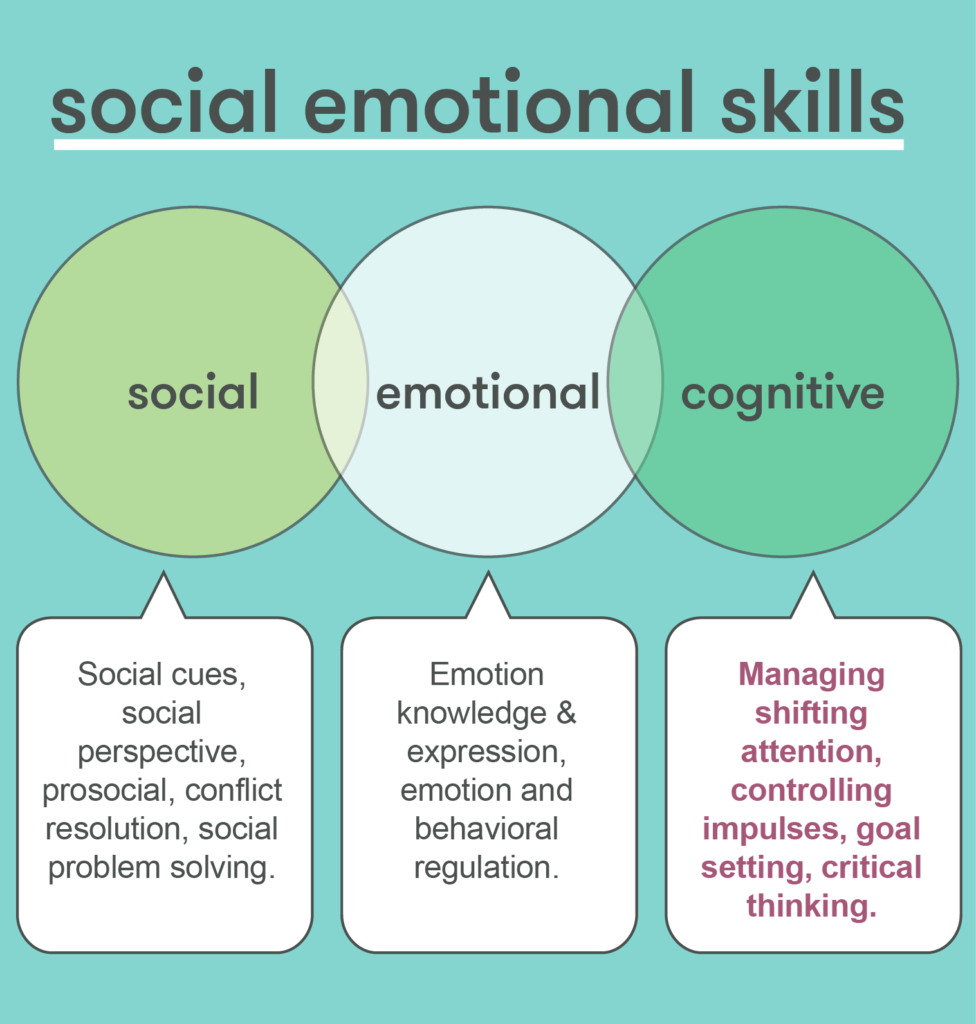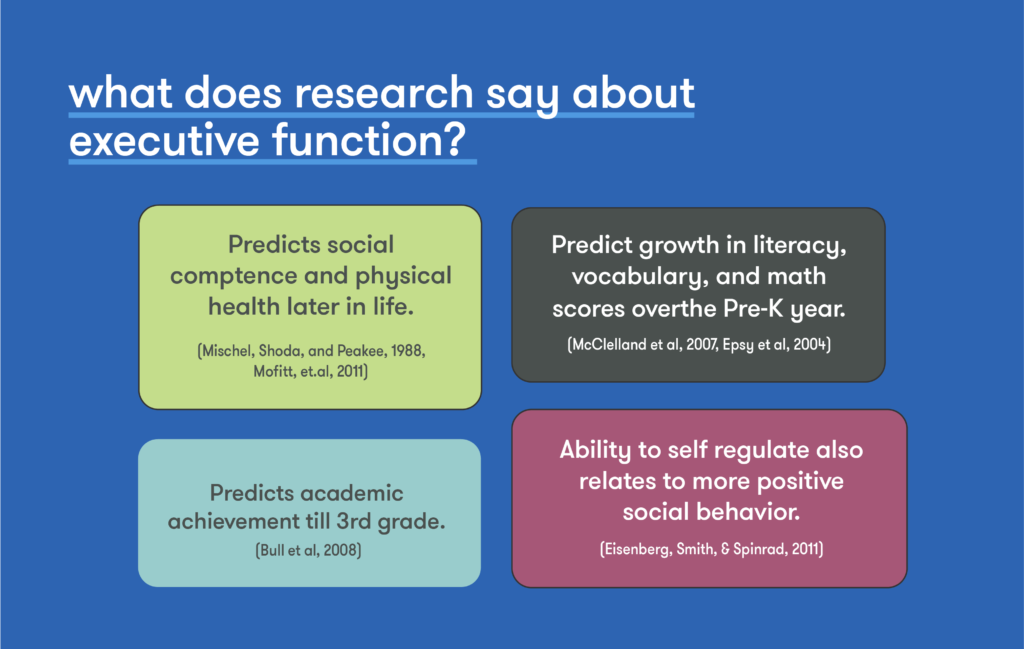At Ethos, we emphasize in our practice and work, nurturing and supporting the social and emotional development of our children to make for a better future. One of the earliest skills that contribute to a socially and emotionally resilient child is developing their executive function skills. Research has shown that having strong executive functioning leads to better outcomes as your child grows.
In this post we will explore what research has to say about executive function and its role in social-emotional development.
What is Executive Function:
Take a minute and think about what your child does and will do in their everyday life.

They might wait to cross the street or play with and then clean up toys. There are many skills that are needed here like waiting for the stoplight to turn to walk even though you want to run and cleaning up toys when it’s time to move on.
These skills are referred to as executive function skills. These skills are the mental processes that allow us to plan, focus our attention, remember instructions, and juggle different tasks.
The Center for the developing child uses the metaphor of an air traffic control system. Just like the control system guides and manages aircraft arrivals and departures, the brain needs to filter information, prioritize, set, and achieve goals, and control impulses. In children, executive function is defined as the accumulation of the following skills: working memory, attention shifting, and response inhibition.
Working memory refers to the ability to hold a piece of information within a short amount of time in your mind. Ex: Remembering 2 step directions: First take off your shoes then go to wash your hands!
Attention Shifting is the ability to switch between thinking about two different things. Ex: moving from one task to another, comparing two things.
Response Inhibition is your ability to select where you choose to pay attention and refrain from getting distracted. Ex: staying engaged in activities when there are other distractions, not talking when it is not your turn
Additionally, executive function skills also include the following:
- Organizational Skills
- Setting and Managing goals
- Planning and Prioritizing
- Time Management
- Being Self Motivated
- Self Control/Self Regulation/Self Evaluative
- Strategic and Critical Thinking
- Flexibility and Adaptability

In our center, we work to encourage and build the development of these skills. Executive function skills already permeate the lives your children already lead, but they are also foundational to the other social-emotional skills that will develop as children grow older such as planning and organizing, conflict resolution, and empathy amongst other skills.
Building Executive Function at home and in the classroom:
We are not born with executive function skills. They develop over time. There is a time period in a human’s life when these skills develop more rapidly than they will at any other point in your life and that is from 3-6 years old (McCoy, et al., 2019).
Executive Function is affected by and influences children’s experience, management of threat, stress, and strong emotions. There are a couple of ways we mention here of how we can cultivate these skills as they develop.
Supportive, Responsive Interactions:
Warm and responsive interactions are truly foundational for the development of executive function skills and healthy development overall. In regards to executive function, giving caring, prompt interactions to support them encourages the ability to learn the task of self soothing when they are young and know that they are supported.
When you do engage in quality time with your children, try to play or do activities that require repetition (like peek-a-boo or a board game for older kids), which allows them to practice holding sequences in their minds or imaginary play, which lets them create complex interactions and utilize them.
Giving short, targeted, repeated instructions:
In our classrooms, teachers are aware of a child’s developmental skills. When a child is given instructions, they are guided with supports to help them hold and focus on the directions being given. Some examples of support are pointing and handing what is being discussed, or asking them to recall what the second directive was if they need.
At home when you are with your child, repeating instructions, offering choices, and guidance on instructions can enhance and aid their executive function development.
Caring, Safe, Learning Environment:
Ethos teachers strive to create and maintain environments where children are able to practice and build their executive function skills amongst others. This is done through having a loving tone and demeanor as well as acceptance and celebration of mistakes and perseverance.
Just like at school, creating the environment where skills can be practiced can happen through having a caring demeanor as well as through practicing co-regulation, which has adults provide guidance, modeling and strategies for the skills they are learning (Murray et al. 2015). For example, when learning how to control our bodies, you may offer a strategy to your child and tell them to hold “imaginary sleeping bunnies” in their hands when they are trying to practice walking slowly and quietly rather than running or labeling feelings and offerings ideas for soothing when they crying.
Developing executive function skills is tied to school achievement, positive behaviors, good health, and successful work (Center for Developing Child, 2012). At Ethos, we support this development through supporting their efforts, modeling skills, engaging in activities and play that will enhance their executive function development, and maintaining a loving presence which children can depend on if and when they need us. Supporting the development of these skills at home and at school can help us set our children to be healthy in heart and mind, ready to take on and learn from the world they live in.
If you would like more information or ever need us, please reach out!
Till Next Post,
Aleezeh Makani
Ethos Early Learning Center Educator
Ethos is a new mindset and model for child care and early education for children aged 6 weeks to 5 years in the South Boston, MA Area. We pride ourselves on our dedication to serving our students and families in ways that are research-driven and nurturing to who they are and can become. Request more information online here!
Bull, R., Espy, K. A., & Wiebe, S. A. (2008). Short-term memory, working memory, and executive functioning in preschoolers: Longitudinal predictors of mathematical achievement at age 7 years. Developmental neuropsychology, 33(3), 205-228.
Eisenberg, N., Smith, C. L., & Spinrad, T. L. (2011). Effortful control: Relations with emotion regulation, adjustment, and socialization in childhood.
Espy, K. A., McDiarmid, M. M., Cwik, M. F., Stalets, M. M., Hamby, A., & Senn, T. E. (2004). The contribution of executive functions to emergent mathematical skills in preschool children. Developmental neuropsychology, 26(1), 465-486.
McClelland, M. M., Cameron, C. E., Wanless, S. B., Murray, A., Saracho, O., & Spodek, B. (2007). Executive function, behavioral self-regulation, and social-emotional competence. Contemporary perspectives on social learning in early childhood education, 1, 113-137.
McCoy, D. C., Gonzalez, K., & Jones, S. (2019). Preschool Self‐Regulation and Preacademic Skills as Mediators of the Long‐Term Impacts of an Early Intervention. Child development, 90(5), 1544-1558.
Mischel, W., Shoda, Y., & Peake, P. K. (1988). The nature of adolescent competencies predicted by preschool delay of gratification. Journal of personality and social psychology, 54(4), 687.
Moffitt, T. E., Arseneault, L., Belsky, D., Dickson, N., Hancox, R. J., Harrington, H., … & Sears, M. R. (2011). A gradient of childhood self-control predicts health, wealth, and public safety. Proceedings of the national Academy of Sciences, 108(7), 2693-2698.